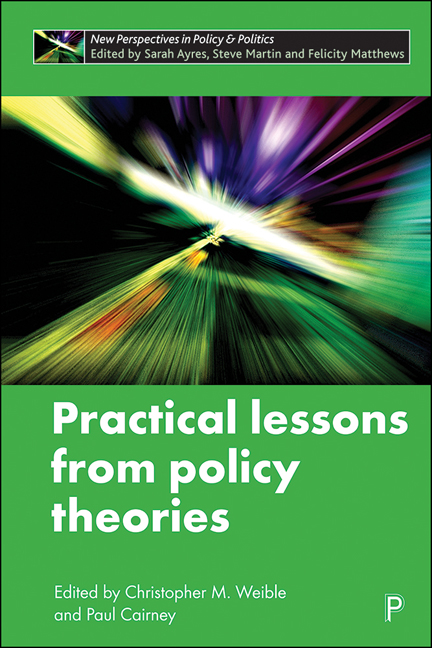Book contents
- Frontmatter
- Contents
- List of figures and tables
- Notes on contributors
- one Purposes and paths in drawing practical lessons from policy theories
- two Three habits of successful policy entrepreneurs
- three Narratives as tools for influencing policy change
- four Using cultural theory to navigate the policy process
- five The lessons of policy learning: types, triggers, hindrances and pathologies
- six Practical prescriptions for governing fragmented governments
- seven Drawing practical lessons from punctuated equilibrium theory
- eight Policy design and the added-value of the institutional analysis development framework
- nine Why advocacy coalitions matter and practical insights about them
- ten Reflections and resolutions in drawing practical lessons from policy theories
- Index
three - Narratives as tools for influencing policy change
Published online by Cambridge University Press: 05 January 2022
- Frontmatter
- Contents
- List of figures and tables
- Notes on contributors
- one Purposes and paths in drawing practical lessons from policy theories
- two Three habits of successful policy entrepreneurs
- three Narratives as tools for influencing policy change
- four Using cultural theory to navigate the policy process
- five The lessons of policy learning: types, triggers, hindrances and pathologies
- six Practical prescriptions for governing fragmented governments
- seven Drawing practical lessons from punctuated equilibrium theory
- eight Policy design and the added-value of the institutional analysis development framework
- nine Why advocacy coalitions matter and practical insights about them
- ten Reflections and resolutions in drawing practical lessons from policy theories
- Index
Summary
Introduction
There is plenty of science, philosophy, and literature pointing to the importance of narrative in human affairs. One way to understand the findings and arguments presented is that people, by nature, are inclined to impose meaning on the world and that when they do, they rely on information shortcuts (heuristics) to develop quick and easy emotional renderings of the world that fit with who they think they are and what they know. People's preferred way of meaning-making is through story (see Jones et al, 2014b). The essence of these interdisciplinary findings is captured by Hardy:
For we dream in narrative, daydream in narrative, remember, anticipate, hope, despair, believe, doubt, plan, revise, criticise, construct, gossip, learn, hate and love by narrative. In order to really live, we make up stories about ourselves and others, about the personal as well as the social past and future. (1968, 5)
If this is true of individuals, it should not be surprising that narrative also matters in public policy. Public policy is navigated by a system of actors who are vying for their preferred policy goals. Within this system, policy actors wield narratives to help achieve their goals, communicate problems and solutions, and citizens use them to communicate their preferences to policy elites, among other uses. However, much of this storytelling is governed by intuition, anecdote, and ad hoc theorising, which is not to malign policy actors – there is little else to go on. Here we try to improve the intuitive ad hoc nature of policy narration by drawing upon extant narrative research in public policy to offer theoretically based and useful storytelling advice. The advice is intended for scholars who may teach or conduct research about policy processes, but who may not be familiar with recent innovations in policy scholarship focused on the role of narrative in policy processes or potential applications of these theoretical innovations for their students. The advice may also be relevant for practitioners who seek to influence policy, and for whom applied lessons from theoretical knowledge can help improve practice.
Our contributions here are twofold: first, we use a recent theoretical innovation in policy scholarship – the Narrative Policy Framework – to build a guide for applied understanding of theory. Second, in service to our general aim, we outline two key pitfalls that can lead to ineffective policy communication.
- Type
- Chapter
- Information
- Practical Lessons from Policy Theories , pp. 35 - 58Publisher: Bristol University PressPrint publication year: 2021



